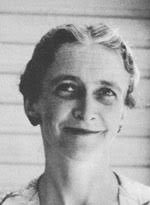After the children left for school, we turned on the radio about 8:25 –and heard of the attack on Pearl Harbor. While listening, we heard planes and went out as usual to see them. Almost over the house quite high, came seventeen big bombers in formation. We could see them plainly and thought they were American. I remarked, ‘‘Well. we probably won’t be standing here looking up at planes like this much longer.’’ As they passed almost opposite the house, we heard a long ripping sound like the tearing of a giant sheet and saw an enormous burst of smoke and earth near officers’ quarters at Camp John Hay—the first bombing of the Philippines before our
eyes. Huge billows of smoke and dust covered the Post as we looked. No one said a word. We turned to each other. speechless. At last Jerry said, hoarsely, “My God, those are Japanese planes.’’ The smoke rolled up and
the smell of powder reached us. We could hear screaming and men yelling orders, Suddenly we all ran into the house. The planes passed out of sight over the mines and mountain ridge.
Our knees were shaky. We kept staring at each other, wondering if we could believe what our eyes had seen. Jerry had to go to the office so I went along. We told Nida to take all the family into the stone rain-drainage ditch
and to lie flat there if any more planes came. I showed her how to pack the Celadon dishes—very old Sung Dynasty Chinese plates. We packed them in between pillows, and then stacked my files and Indusco books together.
As we drove to town, we could see that no one knew what had happened. On Session Road [the main street] everyone was strolling casually, looking into windows, going in and out of stores. Japanese storekeepers stood unconcerned in doorways. We had had no answer from dialing the Post so did not go over. We met Betty Lander pushing her son in his carriage down in market square. She smiled as we stopped to speak, saying. “You don’t need to tell me; I heard the news about Hawaii.” I said, “You’d better take the baby home at once. Those were Japanese planes. We saw them bomb the Post.” She uttered a “My God!” and turned running toward home.
We still couldn’t realize it and didn’t fully take it in for an hour. Everything seemed so quiet and peaceful. I kept saying, “You don’t suppose we are mistaken—we’d better not tell people till we know more—it’s a bad rumor
to start.” Jerry stormed that he knew a bombing when he saw it and that was that.
We met a radioman from the Post. He was all out of breath and his eyes fairly stuck from his head. He started to tell us but we said we had seen it. He gave us some dreadful details. We started to town again but halfway [there] saw the Filipino children streaming from the public school, so we turned back. There was a sound of distant bombing and at last the air-raid siren—one hour after the first bombing.
This was a lone plane laying eggs beyond the Post. Two bombs landed beside a house killing a man and a young Filipino servant girl, blowing out windows and shingles. It was so near other homes that many mothers, children and babies went up the Mountain Trail to stay with friends. Those of us remaining are building bomb shelters.
At Brent, school was dismissed. We went home and stayed there. It has been blackout ever since and we are glad we were prepared. Whenever we hear the throb of motors we rush out to the stone-lined ditch—no telling whose plane it is. Though the sirens are working, we hear the planes long before. I took down all the wall pictures and stowed them in the closet. Nida is wonderful. She keeps working every minute, but is very grim. When we told her the planes had dropped leaflets along the Ilocos coast telling the Filipinos that the Japanese were bringing their independence, she was eloquently silent.
Jerry has contracted for two miners to put in a tunnel for air-raid shelter. it’s built into the bank behind the garage, well-timbered and safe. Meanwhile we pile into the stone ditch. The children are calm, though the third day June said her stomach felt like a lot of fingers working in and out. We sleep in our clothes, as we rest better when ready to dash out into the night.
